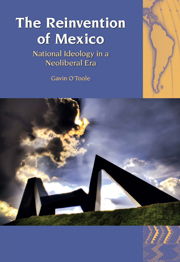4 - Free Trade
from II - Construction: State Discourses
Summary
Salinista discourses on free trade reveal a second major way in which liberalism can be said to conflict with nation-building – at the level of sovereignty. Wedded to the concept of free trade, the Salinas administration redefined the traditional concept of national sovereignty in a way that was most amenable to Mexico's full participation in the global economy.
The administration believed that Mexico could not separate external factors from internal change, a lesson Mexico had learned at great cost in the two previous decades: internal state reform had to be undertaken in tandem with the pressing demands of the new global order. By the end of his term, Salinas was justifying nearly all the changes he had made as being responses to challenges of a truly global character summarized by Rebolledo as the globalization of markets and the formation of new, integrated poles of development, which the salinistas engaged with from a position of Mexico's weakness; a new scientific-technological revolution; and the accentuation of Mexico's relationship with the US following the end of the Cold War.
Salinas rejected extreme liberal positions that saw in globalization an end to nation-states, while reviving the nineteenth-century principle of viability by which Mexico's survival would depend on its ability to compete in the global economy. By taking such a position, he aimed to justify steps to compromise the traditional defence of sovereignty through measures inherent in revolutionary nationalism, such as protectionism.
- Type
- Chapter
- Information
- The Reinvention of MexicoNational Ideology in a Neoliberal Era, pp. 103 - 130Publisher: Liverpool University PressPrint publication year: 2010

